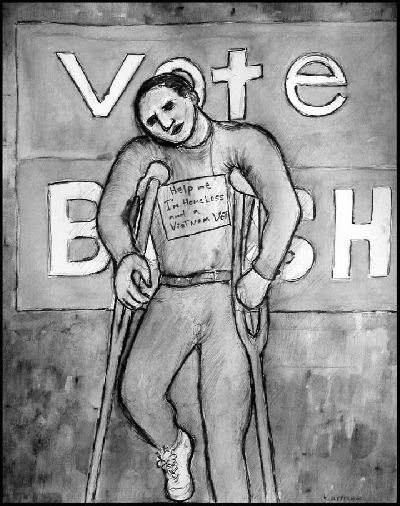|
Comment on this article |
View comments |
Email this Article
|
|
Art of War : Vietnam Vet |
Current rating: 0 |
by Larmee
(No verified email address) |
17 Sep 2004
|
|
Vietnam Vet |
Click on image for a larger version  |
|
Vietnam Vet |

This work is in the public domain |
|
Editorial: Iraq/Is it becoming a lost cause? |
by Editorial: Iraq/Is it becoming a lost cause?
(No verified email address) |
Current rating: 0
19 Sep 2004
|
Editorial: Iraq/Is it becoming a lost cause?
Minneapolis Tribune
September 18, 2004 ED0918
The news about Iraq this week has been all bad. Indeed, if you read what the experts say, Iraq may now be a lost cause. Some sensible people are beginning to utter the unthinkable: Bring the troops home and refuse to pour more blood and money into an obvious -- and monumental -- U.S. defeat. That is not an easy notion to contemplate for two reasons: what it would leave in Iraq and the Middle East, and the explosive repercussions it would have for the United States at home and abroad. But that it is being uttered aloud in polite company underscores a reality Americans must face: There is no good road forward in Iraq.
That reality is at the heart of the classified intelligence estimate on Iraq which was leaked to news organizations this week. The gist of the estimate is this: If everything goes perfectly in Iraq, the best the United States can hope for is a country, as the New York Times said, "whose stability would remain tenuous in political, economic and security terms."
But nothing is going well in Iraq. The insurgency, which began as small groups of enemies taking random shots at American forces then fading quickly away, has strengthened into a sophisticated, large-group guerrilla conflict that experts say the United States most likely can't win, no matter how long it stays in Iraq and how many forces it throws into the conflict.
Vietnam can be overused as a paradigm, but in this case it is instructive. In January 1963, Viet Cong forces stood and fought for the first time at a small hamlet named Ap Bac. They inflicted a major defeat on South Vietnam and signaled a turning point in that conflict from which the South Vietnamese and Americans never really recovered. It took 12 years for the United States to realize the war was lost and to disengage from the conflict. American experts -- including retired and still-serving military officials of high rank -- are saying that Iraq has passed the Ap Bac mark and can only go downhill from here.
The signs suggest they are right. American and Iraqi deaths and casualties are mounting; more and more of the country is becoming a no-go zone for coalition forces, and even the so-called "green zone" in Baghdad no longer is safe. The backlash against Americans from Iraqi civilians is growing. Prospects for holding elections in January become more doubtful day by day -- because you can't hold free elections in areas held by insurgent forces.
All that means the most pessimistic scenarios in the intelligence estimate are more likely to play out. What do they envision? At best, an evolving state of chaos such as has convulsed Lebanon; at worst, out-and-out civil war, in a nation sitting on a huge reservoir of oil, next to aggressive, America-hating, nuclear wannabe Iran.
It's these realities that have people like retired general William Odom, former head of the National Security Agency, quoted in the Guardian saying, "This is far graver than Vietnam. There wasn't as much at stake strategically, though in both cases we mindlessly went ahead with the war that was not constructive for U.S. aims. But now we're in a region far more volatile, and we're in much worse shape with our allies."
On the campaign trail, an odd double standard has appeared: Sen. John Kerry gets hammered unmercifully for not having what critics believe is a viable plan for dealing with Iraq. But President Bush gets a pass on 1) having personally created this monumental American disaster and 2) having no plan before the war and having none now to clean it up. Kerry does deal in nuance, but that can be a good thing when the alternative is to push blindly ahead with a policy that is demonstrably wrongheaded.
Too, as author and journalist Seymour Hersh observed recently, the reason Kerry's solutions may seem lacking to some is that there simply are no good answers to Iraq.
Meanwhile, young Americans keep dying. The 17 days of September, through Friday, cost 55 American lives, the highest rate since April. Bush insists progress is being made in Iraq; all the signs on the ground and most of the opinions from experts say otherwise. Going forward, Bush owes the American people an honest assessment of what the situation is and an honest explanation of how he intends to deal with it.
Editorial, Minneapolis Tribune
http://www.startribune.com/stories/561/4987168.html |



